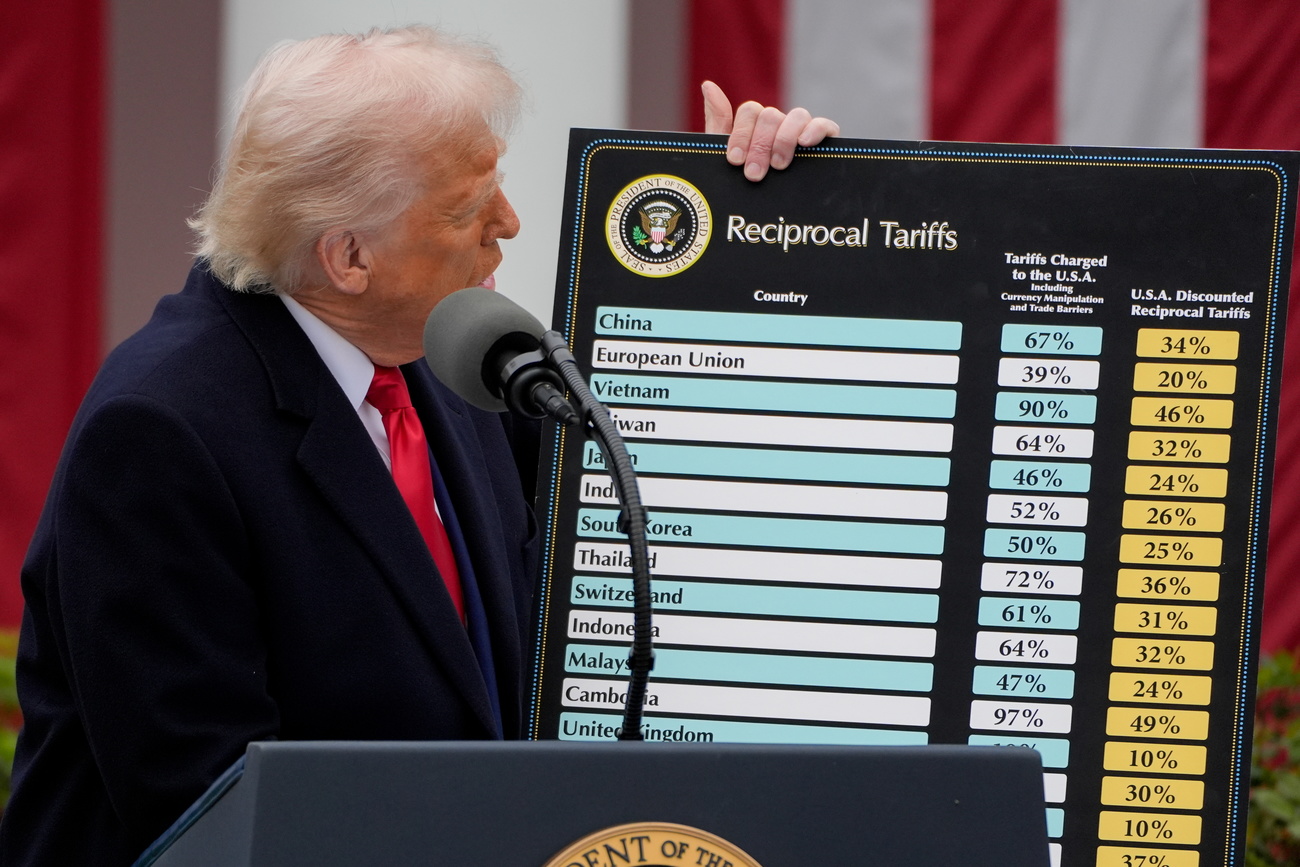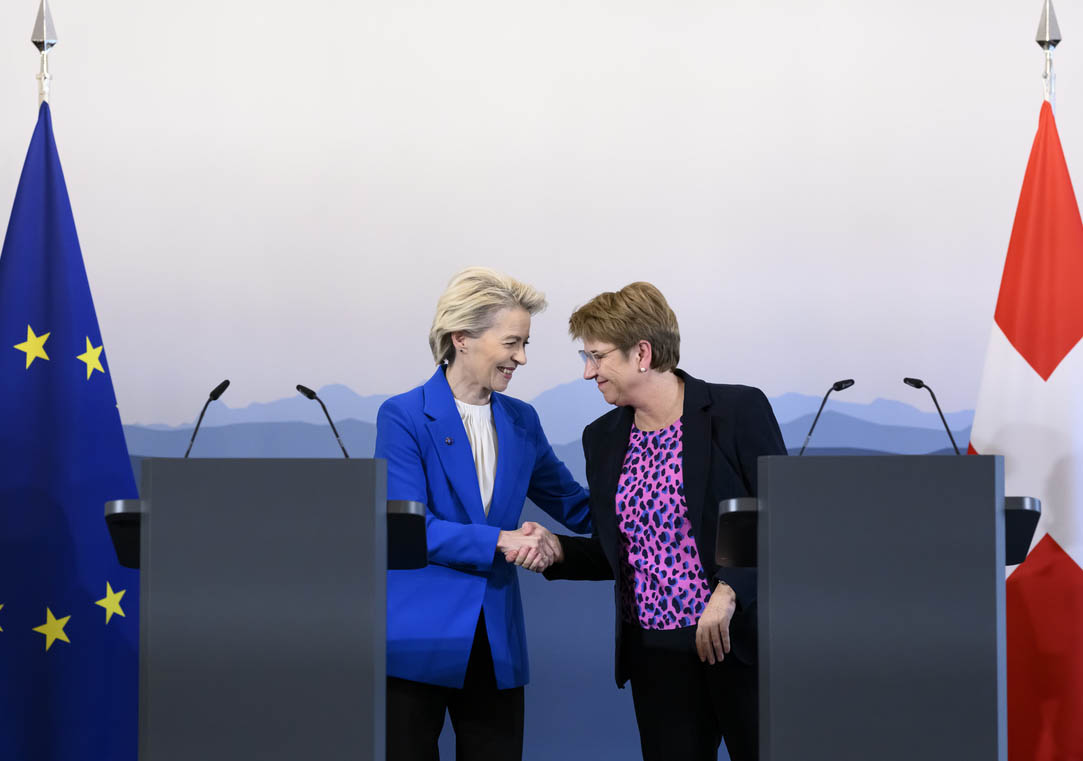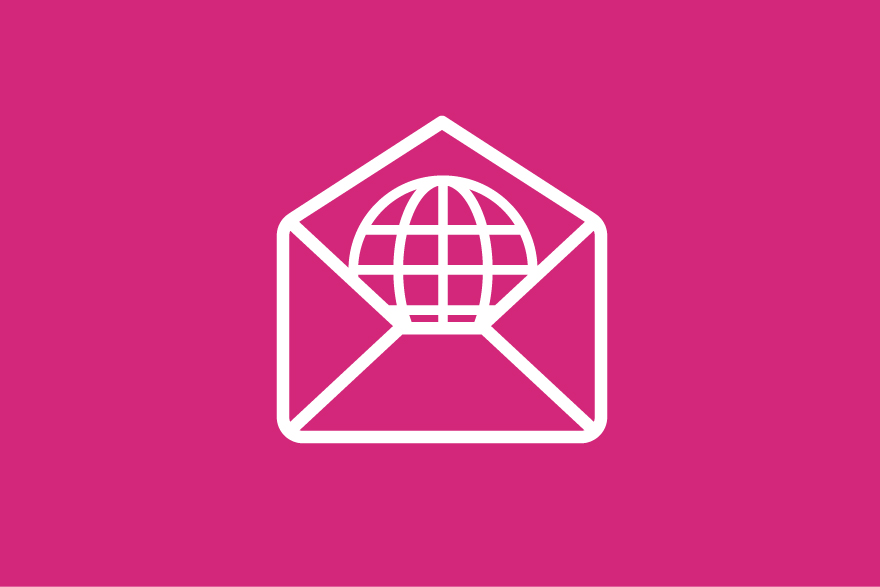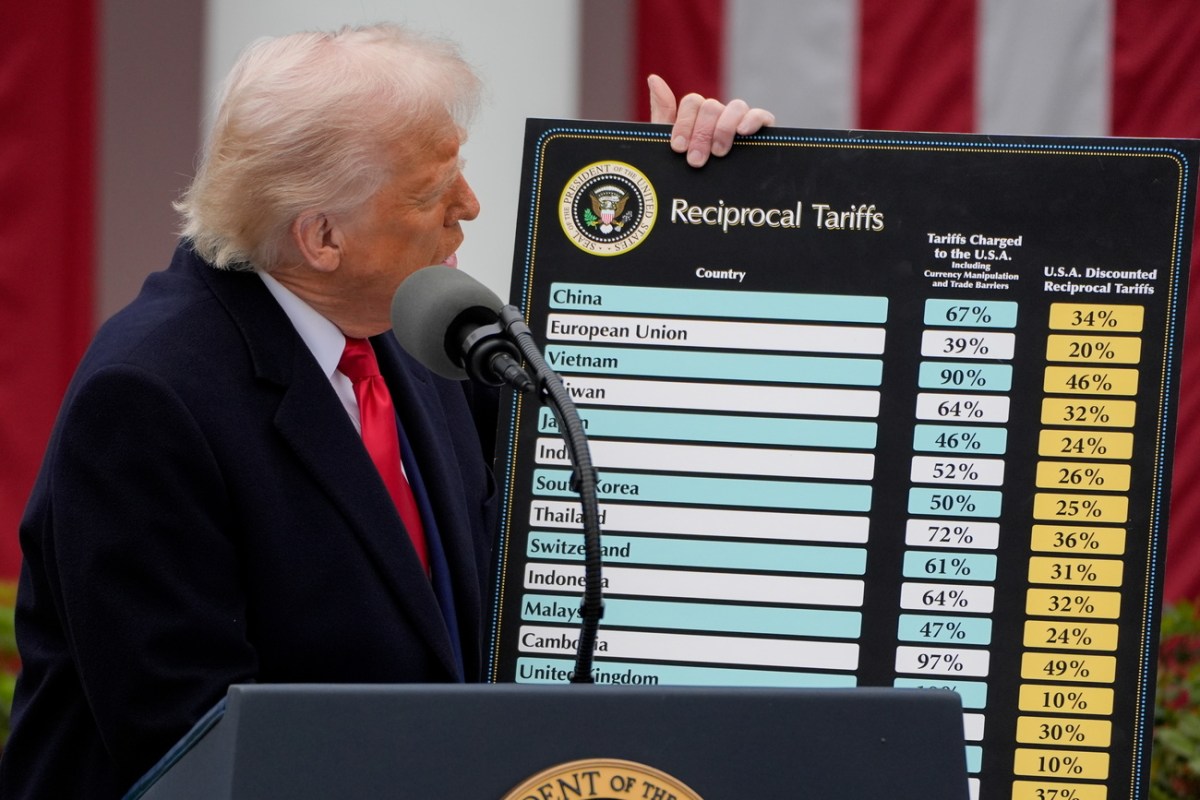
Switzerland remains under economic pressure from the United States following the announcement of the so-called Liberation Day.
Keystone
The US tariffs have sent shockwaves through Switzerland. They give a boost to those who advocate closer ties with the EU – and are a confirmation of international rapprochement in security policy. Swissinfo’s foreign affairs journalist Giannis Mavris analyses the impact on Swiss foreign policy.
The referendum on the Bilateral III Agreements, the new package of treaties with the European Union, will be Switzerland’s most important foreign policy decision. Although the parliament will not deal with it until 2026 and it will take even longer until the vote, the debates are already heated.
The American tariffs announcement on August 1 – on Swiss National Day of all days – has further fuelled the debate on EU relations. And it gives a boost to the supporters of closer ties.
More

More
The Swiss-EU bilateral treaty updates, explained
This content was published on
Jan 29, 2025
Switzerland has negotiated a new agreement with the EU, marking a new chapter in the history of a complex relationship. What is set to change?
Read more: The Swiss-EU bilateral treaty updates, explained
The high US import tariffs of 39% on Swiss goods have been in force since August 7. It came as a shock to the export-oriented Swiss industry in particular – the head of Swissmem, the association of the important mechanical and electrical engineering industry, spoke bluntly of an “attack on Switzerland”. Industry representatives and politicians fear massive job cuts, and some companies have already announced short-time work.
The tariffs are also a shock for another reason: Switzerland was one of the first countries to negotiate with American President Donald Trump after he announced proposed tariffs on his “Liberation Day”. Switzerland was looking at a tariff rate of 31%.
The government acted quickly and announced a “deal”: they had agreed with the US on a joint declaration that provided for 10% tariffs on Swiss products.
More
View the discussion
This fit well with Switzerland’s self-image as a “sister republic” of the US. When Swiss President Karin Keller-Sutter said that she had found “access” to Trump, it seemed to confirm the country’s privileged position.
The idea of privileged ties with US has accompanied Swiss politics since the 19th century, provided justification for neutrality in the World Wars. It also provided impetus for the political concept of spiritual national defence against communism, which led to opposition figures being placed on file in Switzerland during the Cold War. Since the early 1990s, the “special case of Switzerland” has become a political slogan for Switzerland to stay away from European unification.
More

More
Sister republics: what the US and Switzerland have in common
This content was published on
Mar 6, 2024
Switzerland and the United States were once known as “sister republics”. A former ambassador to Switzerland recently evoked the idea again. How have the two states shaped and influenced each other?
Read more: Sister republics: what the US and Switzerland have in common
The 39% tariff announcement plunged the right-wing Swiss People’s Party, the party with the highest number of elected representatives, into a dilemma. In the past, high-ranking members have repeatedly expressed their admiration for Donald Trump and called for closer economic ties with the US – with the aim of minimising trade with the EU. The EU accounts for about half of all Swiss exports, with around 18% going to the US.
The right-wing satirical magazine Nebelspalter promptly identified the culprits for the high tariffs: left-wing “zealous Europhiles” in government and administration had sabotaged the negotiations with the US in order to “sell the Bilaterals III with the EU to the people”. A claim that revolves around an apparently influential group of diplomats and officials for which no evidence was given. Keller-Sutter herself, however, has expressed her opinion: At a press conference, she emphasised that the American president quickly made it clear in the conversation that he wanted high tariffs because of the Swiss trade surplus with the US.
Despite the explanations given by the Swiss president on August 7, there are still unsubstantiated theories doing the rounds as to why the situation derailed. What is clear, however, is that this will make the Bilateral III Agreements with the EU more popular – at least for the time being.
The relationship with the EU is the biggest nut to crack
As important as the American market is for certain sectors of the Swiss economy, the future of the country will be decided by relations with the EU. And the relationship between Bern and Brussels is one of the biggest political fault lines in the country.
More

More
Swiss-EU economic relations in eight charts
This content was published on
Mar 27, 2025
Switzerland and the EU have just concluded a new package of bilateral agreements. Here are some key figures on the long-standing economic links between the two partners.
Read more: Swiss-EU economic relations in eight charts
EU accession is not seriously discussed in Switzerland, because according to polls an overwhelming majority is against it. Rather, the question revolves around the degree of convergence with the European single market, institutions and infrastructure. A majority of the parties support the negotiated contracts; the political right is isolationist, traditionally wanting maximum distance from the EU. What is certain is that the Swiss left is benefiting from the tariff shock as it is traditionally more EU-friendly. But even those who have so far been less willing to position themselves are now in favour of closer ties with the EU, especially from business and the centrist parties.
European security initiatives are becoming more important
However, rapprochement with the EU is also taking place elsewhere – in security policy. First and foremost, of course, this has to do with Russia: the war of aggression against Ukraine has also permanently damaged the feeling of security in Switzerland.
More

More
Explainer: Russia pushes Europe’s neutral states closer to NATO
This content was published on
Jul 19, 2023
Switzerland wants to cooperate more closely with NATO. Other neutral nations in Europe are also seeking closer ties with the alliance.
Read more: Explainer: Russia pushes Europe’s neutral states closer to NATO
Secondly, Trump’s erratic approach to this war is causing uncertainty, especially when he casts doubt on whether the US would stand by its NATO partners in the event of a conflict.
European security initiatives have therefore been pushed forward in recent years and Switzerland is participating in several. For example, participation in various PESCOExternal link cyberdefence projects, the EU’s military cooperation, or participation External link in the European Sky Shield Initiative. Joining the huge EU rearmament plan ReArm Europe is also currently being examined.
There is a consensus between the government and most parties that Switzerland should move closer to the EU militarily, as it does with NATO, while respecting its neutrality. Surveys show that this approach enjoys strong support among the population.
More

More
Neutral Switzerland dips its toe in European military activities
This content was published on
Aug 31, 2024
The Swiss government has decided to participate in military projects of the European Union. What does this mean for the country’s neutrality?
Read more: Neutral Switzerland dips its toe in European military activities
Even more than in the economy, the following applies to security issues: trust and reliability above all. Compared to the US, the European partners look like the epitome of reason and stability.
The Swiss government has already announced that it will continue to lobby the US for a reduction in tariffs and support the Swiss economy with measures. But a quick solution is not to be expected. At a press conferenceExternal link, President Keller-Suter summed up that Switzerland wants a regulated relationship with the United States as it is an important trading partner but not at any price.
Edited by Benjamin von Wyl. Adapted from German by DeepL/ac
More

More
Our weekly newsletter on foreign affairs
Switzerland in a fast-moving world. Join us to follow the latest Swiss foreign policy developments. We offer the perfect immersive package.
Read more: Our weekly newsletter on foreign affairs
Articles in this story
